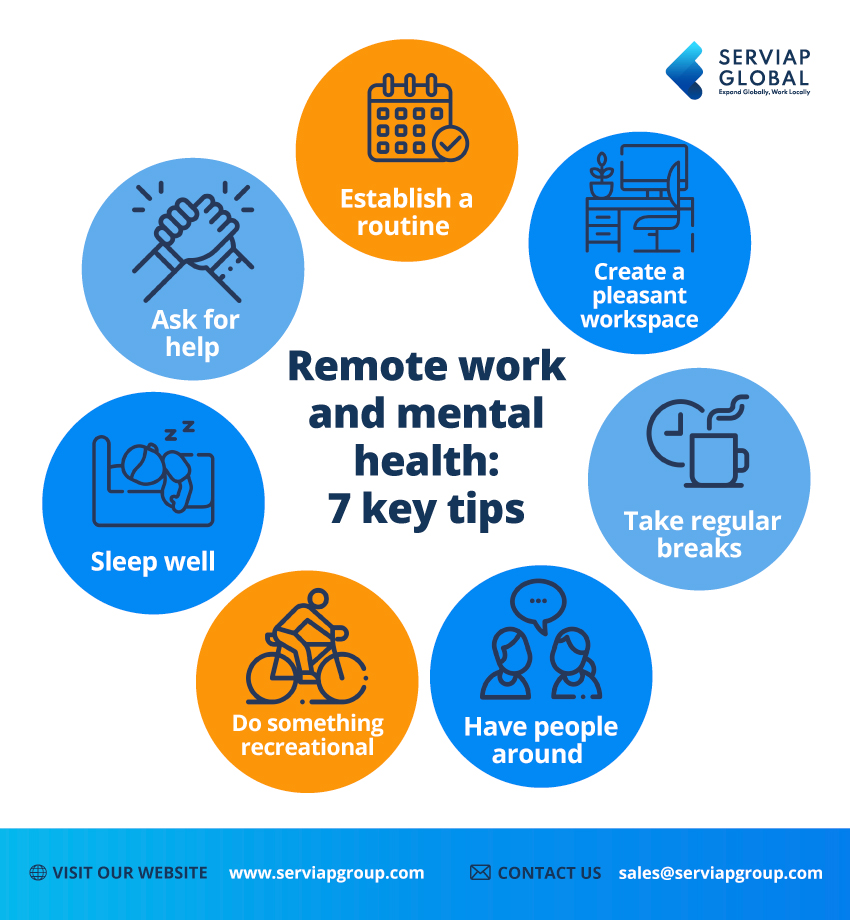Table of Contents
The widespread shift to teleworking brought on by the pandemic made discussion of remote work and mental health a neccessity. Because, while remote and hybrid schedules are generally very popular among professionals, the new lifestyle that many people were forced to adopt also gave rise to a range of issues for many people.
Mental health involves emotional, psychological, and social well-being and affects how we think, feel, and act. For this reason, having good mental health is essential at all stages of life, as it helps determine how we handle stress, relate to others, and make decisions.
Understanding the relationship between remote work and mental health, and taking steps to protect the wellbeing of employees (or yourself if you work remote), can be critical to maintaining productivity and developing a professional’s potential.
Because an employee who has the support and tools needed to maintain good emotional wellness will generally be happier and perform better, and as a result be more committed to the organization.
SEE ALSO: Call center outsourcing: 5 great destinations to consider
Cost savings, flexible schedules, and better work-life balance are some of the advantages of remote work and mental health will benefit from those. Still, it can also cause feelings of loneliness, isolation, anxiety, depression, and burnout.
While companies should concern themselves with remote work and mental health when building a distributed workforce, employees should also make efforts to safeguard their own wellness when working from home or away from the office for extended periods of time.
Below, some of the potential negative psychological effects of telecommuting are considered, before some practical and simple tips are provided on how to protect and imporve mental health among remote workers.
At Serviap Global, around 85% of our global team members work remotely, while the rest are on hybrid schedules. As a provider of international PEO / EOR services, we assist clients with quick and compliant hiring around the world, with the majority of the professionals we hire working remotely, too.
Contact us for more information.
Remote work and mental health: some concerns to look out for
Loneliness and isolation
Humans are naturally sociable, so losing face-to-face contact with co-workers can trigger feelings of loneliness and a lack of belonging in the workplace. Remote work and mental health do not always mesh together well.
Being alone and feeling alone is not the same thing. A person can be around other people and feel misunderstood and alienated. This feeling also puts individuals at risk of physical illness, causes depression, and shortens their lifespan.
In addition, being at home all day, disconnecting from the outside, and not setting schedules for work and other activities are negative factors of remote work and mental health can suffer as people isolate themselves from their families and loved ones.
Anxiety
When discussing remote work and mental health and how to improve emotional wellness, it is necessary to mention anxiety — which often manifests itself as intense and excessive worry, including fear of everyday situations.
Suppose a problem emerges when working remotely and is not immediately resolved. In that case, a person with anxiety may feel fear, restlessness, and uneasiness, a product of internal emotional conflicts. This stops them concentrating on work.
It may be a simple misunderstanding or a minor problem —such as those that arise daily in the workplace— but if employees feel threatened, they might start worrying about worst-case scenarios, such as losing their job.
Depression
Loss of face-to-face work relationships, spending much time at home, and not feeling motivated with daily performance can provoke low mood and sadness. This can kick in with remote work and mental health will suffer accordingly.
Depression is an emotional disorder that causes a feeling of ongoing sadness and a loss of interest in different activities. It affects a person’s feelings, thoughts, and behavior and can bring about various physical and emotional problems.
A remote employee with depression may not only neglect their work and, as a result, have poor performance and low productivity but may even leave the organization.
Burnout
Employee burnout is another concern when facing remote work and mental health as many people now work long hours. Far from improving their productivity, this actually blocks their creativity and reduces their performance.
The World Health Organization (WHO) defines burnout as a syndrome resulting from chronic work-related stress that has not been successfully managed. It is characterized by feelings of exhaustion, negativism, or work-related cynicism and reduced professional effectiveness.
Demanding work schedules with no breaks, no comfortable workspace, being overly distracted, and not setting boundaries between work and personal life can drive a worker to experience burnout.
Remote work and mental health: 7 tips to maintain wellness
Implementing the following seven tips should help many people working remotely maintain or improve their mental health and wellness.
1) Establish a routine
If you are wondering how to improve your emotional wellness when working from home, one of the immediate answers is through a routine. This means you must plan your day, be organized, manage your time, and set schedules for working, eating, and resting.
Flexible schedules are one of the most significant benefits of remote work. Still, they can lead employees to work longer hours than they should, become stressed with remote work and mental health will consequently dip.
Your routine should not only consider the daily hours set by your employment contract but also encourage and promote self-care and healthy habits, such as taking breaks to relax, and stretch.
2) Create a pleasant workspace
Working from home is comfortable, as you have many amenities at your disposal, from a hot cup of coffee and a snack at all times to lying down on your bed to taking a power nap.


But beyond these benefits, creating a pleasant work environment will help you stay focused and relaxed. You can achieve this by purchasing a desk you like and a comfortable chair that enables you to avoid back problems.
Think about what you had in the office that pleased you, like a plant or a postcard from your most recent vacation. Take this decor and add more elements to your home workspace – stick with the things you liked about your office.
3) Take regular breaks during the day
When planning your workday, remember to take breaks, whether it’s to drink water, prepare a meal, take a short walk with your dog, or even sunbathe and breathe fresh air on the balcony. These are among the most highly prized aspects of remote work and mental health is improved by taking advantage of them.
If you’re wondering how to improve your emotional wellness through these breaks, set an alarm to remind you that it’s time to take a break from the computer. These free minutes will help you refresh your mind, reduce stress, become more creative, and, consequently, increase your productivity.
Active pauses, for example, help prevent many conditions related to atrophy and aches that come from sitting for long hours. For this reason, stretch your body every 15 to 20 minutes, from your fingers to your arms and legs, correct your posture, rest your eyes, and continue with your activities.
4) Work around other people or animals
Some people prefer to work alone because they have fewer distractions, but if that’s not the case, telecommute with a friend, partner, or roommates. If you live alone, or otherwise prefer it, working in the company of a pet can also be beneficial.
As previously highlighted, when it comes to remote work and mental health, not having regular interaction with other people can lead to feelings of loneliness, sadness, and isolation.
With this in mind, some remote workers choose to use coworking spaces. In some cases, remote-first companies actually assist employees with finding and accessesing convenient coworking spaces. In the absence of a dedicated facility, local coffee shops, libraries, and other places with an internet connection can also be good options.
5) Maintain a hobby or recreational activity
One of the big advantages of working from home, especially if you are on a flexible schedule, is that it allows you to fiund time for a hobby or other recreational activity. That could be playing sports, cooking, painting, playing an instrument, or anything else that you enjoy.
These activities will not only help you disconnect from the virtual office but also help you establish a good balance between work and your private life. Even just changing clothes can help you differentiate between work mode and home mode.
SEE ALSO: How to start a successful global mobility program in 4 steps
Hobbies and recreational activities are great for socializing but, when it comes to remote work and mental health, it is still recommended that you find dedicated time for socializing, such as meeting friends or family for dinners and other events.
6) Sleep well
The US-based National Sleep Foundation advises that to avoid cardiovascular disease, chronic degenerative diseases, depression, and pain in general, adults between 18 and 64 need seven to nine hours of sleep per night.
When someone doesn’t sleep well, they feel irritable, tired, and it can also affect your memory, in turn diminishing work performance and relationships. So getting a good night’s rest has to be a priority.
Improve your sleep hygiene by going to bed at the same time every day, including on weekends. This is manageable with remote work and mental health will improve accordingly. Disconnect from electronic devices at least half an hour before bedtime, and buy a comfortable mattress, pillows, and bedding.
7) Ask for help
Managing your emotions and knowing your limits and how you react to certain situations is crucial if you are wondering how to improve emotional wellness when you work from home, hybrid, or face-to-face. Remote work and mental health are not always easy to manage, and it’s alright to ask for help.
Try to identify what triggers stress or anxiety and if you can control the situation or if it simply does not depend on you. Also, remember to take breaks, breath, or disconnect from work for a few minutes.
Suppose you feel overwhelmed after doing what you can with the resources and tools at your disposal. In that case, the best thing to do is ask for help from your friends, colleagues, or a mental health professional.


Remote work and mental health: what companies can do
Remote work and mental health are among the issues that most concern companies that have a distributed workforce, in part because employee wellness is directly related to productivity and staff retention, which in turn contribute to good outcomes for the organization.
As an employer, implementing work processes with remote professionals in mind can be important, as can guaranteeing that psychological support is on hand. Beyond that, finding ways to overcome the distance between colleagues — such as with remote team building activities — is also important.
SEE ALSO: 5 great remote team building activities to boost morale
Including space in regular team meetings for team members to talk about their lives and other non-work related matters is also useful. Encouraging them to take breaks and active pauses is also important do demonstrating trust and concern for their wellbeing. So encouraging managers and team leaders to do this is advisable.
Having senior staff lead by example and take measures to maintain emotional wellness can also be a good way to demonstrate to all team members that it is important and that they should feel empowered to look after their own wellbeing.
Serviap Global offers quick, compliant global hiring
At Serviap Global, we assist clients with international PEO / EOR services in over 100 countries. In many cases, the professionals we hire on behalf of clients are teleworking, so we understand the importance of remote work and mental health.
We also offer global talent acquisition services to help companies find candidates for direct hires.
Our company started out in Mexico in 2010, before expanding throughout Latin America and later around the world. We are committed to service excellence and a personalized approach wherever we operate.
Contact us to discover how we can help you hire professionals abroad and learn about our other services.
If you were interested in this article about remote work and mental health, check out the rest of our coverage.






























